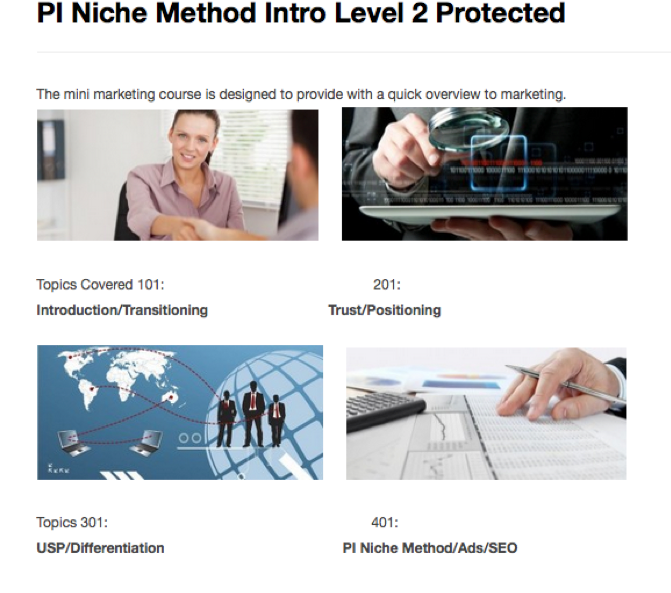
Many private investigators interested in this mini-course are most likely selling some type of service, information or prevention. Selling an intangible is generally not as easy as selling a physical product. Who must be the more skilled salesperson, a life insurance salesperson or someone selling an IPhone? One sells itself, the other requires skill and persuasion to get the sale. Selling prevention is also much more difficult than selling the cure. Because the PI business is basically a service based business, you need to do everything you can to mitigate your inherent inferior selling position.
Yes, that’s correct, the word “selling” has just been used in a private investigator marketing training site, sorry. If you are a self-employed private investigator and actively soliciting business, you are also a salesperson. Like it or not, running a for-profit business requires some type of selling. If, or when you were in law enforcement, you also were a salesperson; however you may not have realized it. You sold your felony case details to the state’s attorney’s office when you were screening a felony. If you were a federal agent, you sold your case to the US Attorney’s Office in order to get charges. If you were a police chief, you sold your ideas to the city council. We all sell everyday in our public and private lives. We sell to our spouses, to our kids, to our co-workers and to our relatives. If you cannot reconcile this fact, you may want to stop here and consider being an employee of a company. Successful agency owners must be skilled in the art of persuasion and sales or, at the very least, hire someone who is.
Marketing for Client Acquisition
You must ask yourself, what is the objective of your marketing efforts and can you afford it? New private investigators tend to want to brand their new businesses by “getting their name out there” and spending large amounts of money.
Definition-Branding: In marketing, the use of logos, symbols, or product design to promote consumer awareness of goods and services.
Dictionary.com
A recent consultation resulted in a new PI saying, “I need to brand my new business ASAP and get my name out there.” The strategy of branding first and obtaining customers second is backwards. New PI’s need to focus more on obtaining a strong client base before spending big money on name recognition, which should come with time. Sure you can try to “buy” name recognition but it is not wise because in today’s social, customer-controlled world, the customer will determine the value of a brand. When you are new business, you need to cultivate new customers first then down the line, focus on branding not vice versa.
In their influential book, Groundswell, Charlene Li and Josh Bernoff state “your brand is whatever your customers say it is…”
The quote, “A smart man learns from his mistakes, while a wise man learns from the mistakes of others” is something you should consider when starting a new PI business. Trial and error can be very, very expensive. If you can drastically shortcut your trial and error and address certain items at the appropriate stages of business, you can move much faster to the goal of profitability.
So, if you are operating a new business and you only have few customers, don’t worry about branding. Worry about obtaining enough customers to become profitable.
Definition-Profitable: Profitable is a financial benefit that is realized when the amount of revenue gained from a business activity exceeds the expenses, costs and taxes needed to sustain the activity. There are different levels of profitability and it should not be confused with with public budgeting experience.
Another recent consultation resulted in a retired police chief comparing profitability and public police budgeting. The chief, who was in the process of getting licensed in the State of Illinois, proclaimed, “My 10 million dollar police dept. came in under budget every year due to my budgeting skills, so I know all about budgets and profitability“. Having public budget experience is just that…public budget experience, it has very little transference to the new world he was about to enter… the private sector.
The Major Difference between the public and private sector budgeting?
Mindset
All publicly funded budgets are funded with tax dollars, not your capital or your capital raising efforts. Because of this, your approach to allocating resources will require a different paradigm. The concept of “risk” now comes into play, Your Risk. You are risking your time and money so you must do things differently than when you were running a government funded budget.
- First and foremost, if you mortgaged your house to start a business or took out a loan, you will find yourself evaluating the pros and cons of expenditures with a fine tooth comb.
- Your tolerance for inefficiency should be reduced to a new level, much different than in the public sector where slow moving union employees are “just doing the minimum”.
- Profit and competition are two elements that you may have to address with a comprehensive long-term strategy.
- Effectiveness and efficiency are now paramount.
- Going “over-budget” is not something to be taken lightly… as there is no general fund to draw from if you go over budget.
- You also cannot waste time acquiring clients because time is money.
On the positive side, you can implement changes fast, real fast. There are no more unions to deal with, no more “retired on duty” officers and no more tolerating officers with disciplinary files thicker than a New York City phone book. If you run your private business similar to the way the average police dept. is run, your chance for survival will be small. So, you must break whatever public sector habits you developed and realize that private sector is a completely different beast.
During this mini-training you will be exposed to many different marketing concepts and strategies. Some may work for you, some may not. They are an accumulation of several current and retired private investigators marketing experiences from different geographical areas. Interviews and surveys over the past few years were conducted to gain insight on what PI agency owners are really dealing with when it comes to running their businesses. Even if you have no desire or time to learn marketing, you better be willing to have a good working knowledge of how things work. Whether your a D.I.Y.’er or a PI who likes to outsource, its good business practice to be able to consider other peoples previous positive and negative experiences and then incorporate them into your business strategy.


